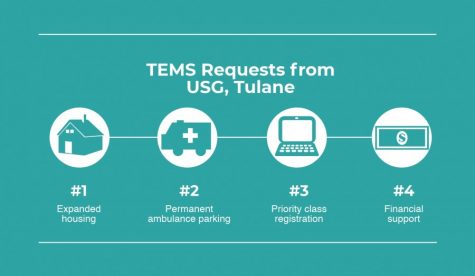TEMS partners with USG to expand resources, rebrand after shutdown
April 24, 2019
Working 12-hour shifts, training rigorously for a semester and clocking 90 hours of service a month is no average job description.
For Tulane Emergency Medical Services, which has been rebuilding and rebranding since hazing charges knocked the organization out of service in 2015, the resources provided by the university have not matched its level of dedication.
“We’re really asking from students to students to get behind us and help us make some changes that could really benefit our organization,” TEMS Personnel Lieutenant Ann Marie Barfield said.
Barfield and TEMS Administrative Captain Griffin Kulick came to the Undergraduate Student Government with a request for more support and resources. Some of their requests included an expansion of housing for on-call EMTs and an increase to the TEMS service area.
USG passed legislation March 26 affirming its support for these requests.
“They do so much work for us — it was literally the least we could do [to] help them and support them,” USG President Erin Blake said. “That is USG’s job, to advocate for students.”

The requests
While on duty, TEMS members work 12-hour shifts and are required to stay within the confines of campus. The three EMTS on call share a bunk bed in a Diboll Parking Garage space.
Counseling and Psychological Services is moving into an adjacent space, and TEMS members fear their quarters will shrink even more. Prior to its shutdown, TEMS owned a house on Ben Weiner Drive and South Claiborne Avenue.
TEMS is asking for a new space that would allow its members, which number more than 70, to train and work as well as shower, sleep and eat.
“Now that we are fully functioning, the beds and the living space have become a huge issue, because it’s hard to live and work in the space we have,” Barfield said.
Additionally, TEMS currently serves individuals within the streets of St. Charles, South Claiborne, Calhoun and Pine, an area of approximately one half square mile. Before 2015, TEMS was serving an area over four times that size, within the streets of Jefferson, South Claiborne, South Carrollton and Earhart.
The organization is also asking for a more permanent parking spot for its ambulance and priority class registration for its members.
Shutdown history
In September of 2015, the Office of Student Conduct found TEMS guilty of hazing and placed it on deferred suspension until March 2016. The administration did not comment on what type of hazing took place.
The organization was forced to reduce its vehicle fleet from five to two, to lose its house and to reduce its service area.
Since then, TEMS has completely changed its recruitment process, standardized interview questions and hired an adult TEMS Coordinator who provides training and management.
After the shutdown, TEMS gradually began to rebuild its operation schedule. It went from only working weekends to working 18 hours per day, five days per week, and finally to working full-time in February 2018.
“It’s been a slow phasing back, but we haven’t gotten any of the resources to come with it,” Allison Foster, lead TEMS EMT and USG director of Student Health and Wellness, said.
Support from the administration
After passing the USG legislation, Blake met with Medical Director of Campus Health Daniel Garrett, Assistant Vice President Scott Tims and representative of Facility Services Amber Beezley.
According to Blake, Beezley plans to work with Campus and Facility Services to ensure TEMS would be next on the list for an upgraded space if an opportunity arises.
Tims and Garrett plan to address TEMS members about how the space will change once CAPS moves in, underlying their commitment to finding a long-term solution.
Awareness of mission
Beyond the call for a larger space or financial support, TEMS members hope the legislation will help students understand what their organization does.
“We respond to students who need help,” Cade Herman, next year’s TEMS administrative captain, said. “That’s the essence of who we are. It’s often portrayed that we only transport … people under the influence.”
The USG legislation emphasizes that only a third of TEMS calls are alcohol-related, that this cohort of EMTS does not include any members involved with 2015 hazing allegations, and that members are unpaid for their 90 hours of work each month.
Also listed are several statistics that Foster and Herman helped to research and compile. TEMS transported over 250 patients over a five-month period and saved students an average of $950 for ambulance costs.
TEMS is hoping to debunk misconceptions and shed its old reputation on campus.
“Something that money can’t buy is having a very open dialogue with the community and the administration and students about what we do,” Herman said.










Leave a Comment